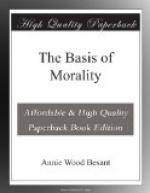Conscience is the result of the accumulated experience gained by each man in his previous lives. Each of us is an Immortal Spirit, a Divine fragment, a Self: “A fragment of mine own Self, transformed in the world of life into an immortal Spirit, draweth round itself the senses, of which the mind is the sixth, veiled in Matter.” Such is each man. He evolves into manifested powers all the potentialities unfolded in him by virtue of his divine parentage, and this is effected by repeated births into this world, wherein he gathers experience, repeated deaths out of this world into the other twain—the wheel of births and deaths turns in the [T.]riloka, the three worlds—wherein he reaps in pain the results of experiences gathered by disregard of law, and assimilates, transforming into faculty, moral and mental, the results of experience gathered in harmony with law. Having transmuted experience into faculty, he returns to earth for the gathering of new experience, dealt with as before after physical death. Thus the Spirit unfolds, or the man evolves—whichever expression is preferred to indicate this growth. Very similarly doth the physical body grow; a man eats food; digests it, assimilates it, transmutes it into the materials of his body; ill food causes pain, even disease; good food strengthens, and makes for growth. The outer is a reflection of the inner.
Now conscience is the sum total of the experiences in past lives which have borne sweet and bitter fruit, according as they were in accord or disaccord with surrounding natural law. This sum total of physical experiences, which result in increased or diminished life, we call instinct, and it is life-preserving. The sum total of our interwoven mental and moral experiences, in our relations with others, is moral instinct, or conscience, and it is harmonising, impels to “good”—a word which we shall define in our fourth chapter.
Hence conscience depends on the experiences through which we have passed in previous lives, and is necessarily an individual possession. It differs where the past experience is different, as in the savage and the civilised man, the dolt and the talented, the fool and the genius, the criminal and the saint. The voice of God would speak alike in all; the experience of the past speaks differently in each. Hence also the consciences of men at a similar evolutionary level speak alike on broad questions of right and wrong, good and evil. On these the “voice” is clear. But there are many questions whereon past experience fails us, and then conscience fails to speak. We are in doubt; two apparent duties conflict; two ways seem equally right or equally wrong. “I do not know what I ought to do,” says the perplexed moralist, hearing no inner voice. In such cases, we must seek to form the best judgment we can, and then act boldly. If unknowingly we disregard some hidden law we shall suffer, and that experience will be added to our sum total, and in similar circumstances in the future, conscience, through the aid of this added experience, will have found a voice.




